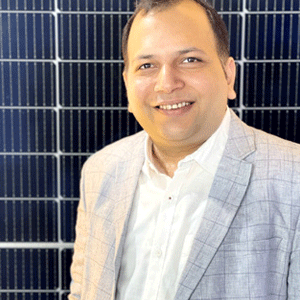
The ongoing progress toward a decarbonized economy, supported by legislative energy policies and incentives, is a fundamental shaping element for the growth of the Solar PV Module industry. Favorable government policies, including incentives, have also been implemented to encourage the use of various renewable technologies, including solar PV. When collaborating with a manufacturer, a prospective client would search for the highest quality standards, quick delivery, and prompt after-sales assistance.
Solarium Green Energy is India's leading integrated solar PV module manufacturing company and turnkey solar solutions provider, offering a full spectrum of solar energy solutions. Ankit Garg (IIT / ISM Dhanbad Alumni) founded the company in 2017, which is headquartered in Ahmedabad (Gujarat) India and is led by an entrepreneurial team with significant cross-functional experience and a ground-level understanding of the renewable energy market.
Solarium Green Energy provides precision-manufactured and market-leading Smart Solar PV Modules manufactured at its cutting-edge design and production facilities. Solarium Green Energy Modules are made from the best materials available in the market and include best-in-class quality and technology. Solarium Green Energy's product portfolio includes high quality and high-efficiency solar panels with power ratings ranging from 40Wp to 550Wp that are internationally certified and meet BIS standards.
“We believe in making the complex powerfully simple—from system design to customer service, by ensuring our clients have all the resources they need for a bankable project,” says Ankit Garg, Founder at Founder, Solarium Green Energy.
Strict Adherence to Quality Standards
Solar PV Modules are made of high-grade materials and have best-in-class quality and performance. The company's meticulous product design and stringent quality control, ensures an exceptionally high PV yield. The sapphire series monocrystalline solar modules are the all-arounders among solar PV modules. Whether for small or large power plants, high-quality solar modules with up to 21.30 percent efficiency deliver an amazing energy yield at a fair cost. The sapphire series polycrystalline solar modules are the solar PV modules' all-rounders. Whether for small or large power plants, high-quality solar modules with up to 17.38 percent efficiency deliver an amazing energy yield at a fair cost.
Solarium Green Energy's PV modules can withstand high winds, snow loads, and corrosive conditions. To assure each module's lifetime performance and maximum energy yield, rigorous durability and performance testing are done. Each Solarium Green Energy panel is subjected to a series of tests to ensure its efficiency and output capacity in a variety of geographical areas, as well as under adverse weather circumstances.
We believe in making the complex powerfully simple—from system design to customer service, by ensuring our clients have all the resources they need for a bankable project
Industry Leading State-of-the-Art Manufacturing Facility
Solarium Green Energy has a 100 MW state-of-the-art solar panel manufacturing plant in Ahmedabad (Gujarat) India, integrated with a dust-free clean-room and an in-house R&D center. The company's revolutionary automation method has effectively boosted total capacity, quality, and efficiency, from cell cutting to final QC. Furthermore, the versatility of its own automation lines allows for small series as well as huge volumes of varied application solar modules. Solarium Green Energy has a reputation for delivering defect-free products since quality is the primary priority, which is supported by a high degree of automation and other QC types of equipment and processes.
Solarium Green Energy Panels are powered by silicon cells that are well-known in the market for their outstanding performance and dependability. The modules were conceived and engineered by qualified industry technocrats. “Going forward, we would be constantly upgrading our manufacturing capability to bring the needed innovation so as to make the world a more solar-driven environment,” concludes Ankit.
We use cookies to ensure you get the best experience on our website. Read more...